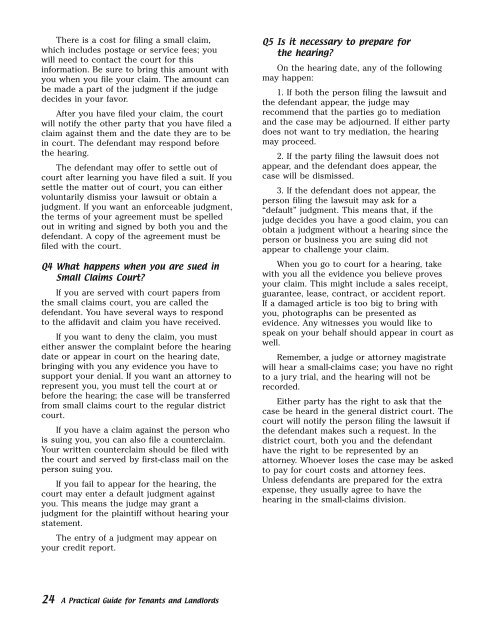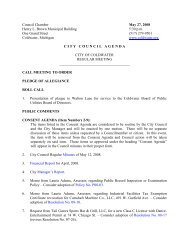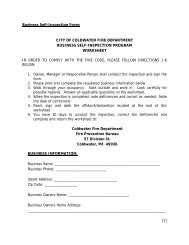Landlord Tenant Guide - State of Michigan
Landlord Tenant Guide - State of Michigan
Landlord Tenant Guide - State of Michigan
- No tags were found...
You also want an ePaper? Increase the reach of your titles
YUMPU automatically turns print PDFs into web optimized ePapers that Google loves.
There is a cost for filing a small claim,which includes postage or service fees; youwill need to contact the court for thisinformation. Be sure to bring this amount withyou when you file your claim. The amount canbe made a part <strong>of</strong> the judgment if the judgedecides in your favor.After you have filed your claim, the courtwill notify the other party that you have filed aclaim against them and the date they are to bein court. The defendant may respond beforethe hearing.The defendant may <strong>of</strong>fer to settle out <strong>of</strong>court after learning you have filed a suit. If yousettle the matter out <strong>of</strong> court, you can eithervoluntarily dismiss your lawsuit or obtain ajudgment. If you want an enforceable judgment,the terms <strong>of</strong> your agreement must be spelledout in writing and signed by both you and thedefendant. A copy <strong>of</strong> the agreement must befiled with the court. If you are served with court papers fromthe small claims court, you are called thedefendant. You have several ways to respondto the affidavit and claim you have received.If you want to deny the claim, you musteither answer the complaint before the hearingdate or appear in court on the hearing date,bringing with you any evidence you have tosupport your denial. If you want an attorney torepresent you, you must tell the court at orbefore the hearing; the case will be transferredfrom small claims court to the regular districtcourt.If you have a claim against the person whois suing you, you can also file a counterclaim.Your written counterclaim should be filed withthe court and served by first-class mail on theperson suing you.If you fail to appear for the hearing, thecourt may enter a default judgment againstyou. This means the judge may grant ajudgment for the plaintiff without hearing yourstatement.The entry <strong>of</strong> a judgment may appear onyour credit report. On the hearing date, any <strong>of</strong> the followingmay happen:1. If both the person filing the lawsuit andthe defendant appear, the judge mayrecommend that the parties go to mediationand the case may be adjourned. If either partydoes not want to try mediation, the hearingmay proceed.2. If the party filing the lawsuit does notappear, and the defendant does appear, thecase will be dismissed.3. If the defendant does not appear, theperson filing the lawsuit may ask for a“default” judgment. This means that, if thejudge decides you have a good claim, you canobtain a judgment without a hearing since theperson or business you are suing did notappear to challenge your claim.When you go to court for a hearing, takewith you all the evidence you believe provesyour claim. This might include a sales receipt,guarantee, lease, contract, or accident report.If a damaged article is too big to bring withyou, photographs can be presented asevidence. Any witnesses you would like tospeak on your behalf should appear in court aswell.Remember, a judge or attorney magistratewill hear a small-claims case; you have no rightto a jury trial, and the hearing will not berecorded.Either party has the right to ask that thecase be heard in the general district court. Thecourt will notify the person filing the lawsuit ifthe defendant makes such a request. In thedistrict court, both you and the defendanthave the right to be represented by anattorney. Whoever loses the case may be askedto pay for court costs and attorney fees.Unless defendants are prepared for the extraexpense, they usually agree to have thehearing in the small-claims division.





